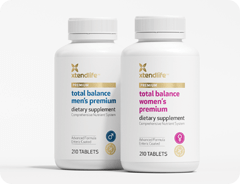Early menopause, defined as the cessation of ovarian function before the age of 45 years, affects approximately 10% of women in Western populations.[1] Recent research suggests that women who experience early menopause are at increased risk of osteoporosis, cardiovascular disease, cognitive decline, and in some cases, premature mortality.[2],[3] A new study found that women who adopt a healthy balanced eating pattern consisting of oily fish, and fresh legumes versus refined pasta and rice delayed the onset of menopause.[4] Another study in the American Journal of Clinical Nutrition linked potential lower levels of Vitamin D and calcium to early menopause.
What Should I Eat to Delay and Manage Menopause Symptoms?
The good news is that a balanced, heart-healthy diet low in saturated fats, and sodium and high in omega-3 and fiber, may delay menopause and alleviate menopausal symptoms. This dietary pattern also helps to reduce the risk of cardiovascular disease and osteoporosis associated with decreased levels of estrogen during menopause and post-menopause.
Heart Healthy Fats
Aim to consume omega-3 fatty acids from food sources not only help delay the onset of menopause but also boost cardiovascular health. The American Heart Association recommends eating fish (particularly fatty fish) at least two times (two servings) a week for heart health benefits.
- Fatty fish: salmon, mackerel, herring, trout, sardines, albacore tuna
- Nuts and seeds: walnuts, chia seeds, ground flaxseeds
Plant-based Eating
Incorporating more vegetarian options and cutting down red meat consumption can ease some of the menopause symptoms. Asian women who followed traditional plant-based diets experienced fewer hot flashes compared to Western women on high-fat, low-fiber diets. Furthermore, a plant-based diet is high in fiber, which serves as prebiotics for the gut microbiome and promotes digestive health.
- Legumes: chickpeas, beans (cannellini beans, red kidney beans, adzuki beans, black-eyed beans, and soybeans)
- Seasonal fruits and vegetables
Vitamin D and Calcium
As noted at the beginning, lower levels of vitamin D and calcium may be potentially linked to early menopause. In addition, they are crucial in preventing osteoporosis which is common after menopause. vitamin D is a fat-soluble vitamin that is naturally present in very few foods. It is produced when ultraviolet rays from the sunlight strike the skin and trigger the production of vitamin D inside the body. It promotes calcium absorption and bone growth.
- Vitamin D: fatty fish listed above, cheese, egg yolks, and vitamin D-fortified food such as orange juice, dairy, and cereals.
- Calcium: dark leafy greens (collard greens and kale), broccoli, sardines, dairy (cheese, yogurt, milk)
Natural Menopause Supplements
Xtendlife Hormone Support for Her is a feminine health supplement that balances hormones naturally for women of all ages. It relieves symptoms of premenstrual syndrome (PMS), and menopause, supports female reproductive health, and breast health, and manages mood swings. Its science-based formula is safe and effective and can be used long-term for supporting hormonal health and female well-being.
A healthy, balanced diet focusing on healthy fats, plant-based food, vitamin D, and calcium can potentially delay menopause and lessen the symptoms of menopause. By adding Xtendlife Hormone Support for Her into your supplement regimen, women can finally embrace this transition with fewer unpleasant symptoms and more confidence.
References:
[1] Shuster L, Rhodes D, Gostout B, et al. Premature menopause or early menopause: long-term health consequences. Maturitas 2010;65:161–6
[2] Wellons M, Ouyang P, Schreiner P, et al. Early menopause predicts future coronary heart disease and stroke: the multi-ethnic study of atherosclerosis. Menopause 2012;19:1081–7
[3] Bleil M, Gregorich S, McConnell D, et al. Does accelerated reproductive aging underlie premenopausal risk for cardiovascular disease? Menopause 2013;20:1139–46
[4] Dunneram Y, Greenwood DC, Burley VJ, et al. Dietary intake and age at natural menopause: results from the UK Women’s Cohort Study. J Epidemiol Community Health2018;72:733-740


 Supplements
Supplements Superfoods
Superfoods Bundles
Bundles








